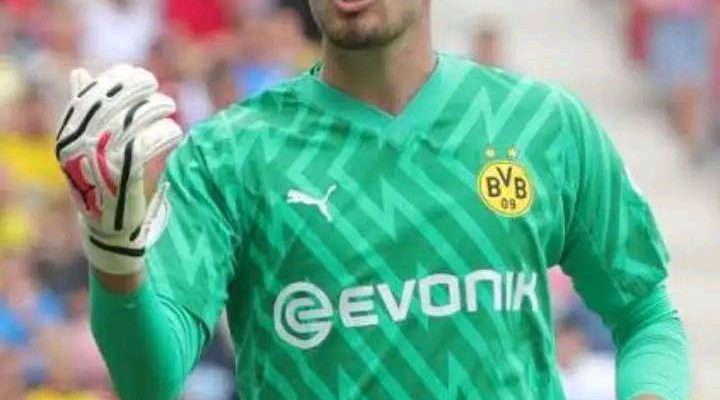Gregor Kobel, the towering Swiss shot-stopper, has just sent ripples through the football world with what many are now calling a legacy-defining milestone. With an astonishing record of 46 clean sheets in just 122 appearances for Borussia Dortmund, Kobel is not merely climbing the ranks—he’s crashing through them. In a club rich with history, boasting iconic figures like Roman Weidenfeller and Jens Lehmann before him, Kobel’s name is now being placed right at the top, sparking furious debates and emotional responses across the fanbase, pundits, and football purists alike.
What makes this recognition so seismic is not just the number of clean sheets, but the manner in which they were earned. Kobel has showcased a goalkeeping style that combines acrobatic reflexes with stoic composure. His shot-stopping abilities are otherworldly at times, reminiscent of the elite few who seemed born for the position. But it’s his leadership and consistency that have truly elevated him to legendary status. Whether barking orders at his backline, commanding his box with authority, or launching precision passes to ignite counterattacks, Kobel has redefined what it means to be a modern goalkeeper at Borussia Dortmund.
His influence between the sticks has transformed Dortmund’s defense from one often criticized for its volatility into a relatively disciplined unit. In high-pressure Bundesliga clashes and crucial Champions League nights, Kobel has emerged time and again as the linchpin of the team. And while Borussia Dortmund’s brand has traditionally revolved around attacking flair and youthful exuberance, Kobel’s presence has brought a spine of steel to the squad. His calm under fire and ability to produce miracles in goal have not gone unnoticed. Whether it’s a fingertip save in the dying moments of a Revierderby or a penalty stop on the European stage, Kobel’s contributions go beyond statistics—they’re etched in emotion.
One cannot ignore the symbolic weight of his achievements either. The DFB-Pokal victory, while a team effort, bore his imprint in key moments. Throughout the campaign, his performances served as the bedrock of Dortmund’s success. It was during that cup run that fans began to whisper what now has become a thunderous chant: Kobel isn’t just good—he might be the greatest to wear the gloves for BVB. Even in the Bundesliga, amidst stiff competition from the likes of Bayern Munich and RB Leipzig, Kobel has stood out. His ability to keep Dortmund competitive—especially in title races that went down to the wire—has played a major role in lifting the club’s standards. A single mistake from a goalkeeper can cost a title, and Kobel has made fewer than most.
Naturally, such an accolade doesn’t come without controversy. Borussia Dortmund fans are fiercely loyal, and any comparison to Roman Weidenfeller is bound to provoke strong reactions. Weidenfeller, after all, is a club icon who stood guard for over a decade, winning two Bundesliga titles and playing a critical role in the team’s fairy-tale run to the 2013 UEFA Champions League Final. His longevity and heroics, particularly under Jürgen Klopp, forged an emotional bond with supporters that is hard to rival. For many, Weidenfeller’s name is synonymous with Dortmund’s most romantic era of modern football. So, to anoint Kobel as the club’s greatest is not just an analysis of skill—it’s a statement that rattles memory and emotion.
Yet, the statistics and the style of play suggest a legitimate shift in the throne. While Weidenfeller’s prime was undoubtedly impressive, Kobel has faced a different kind of challenge. Modern football demands more from goalkeepers: not just to stop shots, but to initiate attacks, play under pressure, and maintain razor-sharp focus in high-pace matches. In this more demanding environment, Kobel hasn’t just survived—he’s thrived. His distribution is precise, often functioning as a third center-back. His sweeping duties are handled with a Neuer-esque confidence, and his one-on-one saves have become trademark moments. For younger fans, he is the first goalkeeper they’ve seen truly dominate a game in black and yellow, and for them, the idea of someone being better feels abstract.
Social media has erupted in the wake of this claim, with debates turning heated and tribal. Has nostalgia clouded people’s memories of Weidenfeller’s flaws? Are Kobel’s performances being overhyped due to recency bias? Every corner of Dortmund’s fanbase seems to have an opinion, and in true footballing fashion, there’s no consensus. Supporters born in the 1990s fiercely defend Weidenfeller, while those raised in the 2010s are already calling Kobel their goalkeeper of a lifetime. Former players and pundits have also weighed in—some praising Kobel’s ceiling as even higher than any of his predecessors, while others urge caution, citing the need for longevity and silverware to truly claim the crown.
But perhaps the most compelling argument in favor of Kobel lies in his consistency. In a footballing age dominated by data and metrics, he ranks among the top goalkeepers in Europe for save percentage, goals prevented (a stat comparing expected goals to actual goals conceded), and clean sheet ratio. He has not had the luxury of playing behind a rock-solid, world-class defense every week—often, he’s had to be the one saving Dortmund from collapse. And he’s done so with stunning regularity. It’s one thing to rack up clean sheets behind a dominant team; it’s another to produce them while under siege. Kobel has done the latter, and with style.
Then there’s the intangible factor of presence. Every great goalkeeper has it—that aura that makes strikers hesitate, that quiet confidence that steadies a team. Kobel possesses this in spades. Whether you’re watching from the stands or on a screen, his presence is unmistakable. You feel like he’s in control, that whatever comes Dortmund’s way, he’ll handle it. That kind of psychological impact is rare and invaluable.
His leadership off the field has also earned respect. While not always the most vocal in media appearances, those within the club speak highly of his professionalism, his focus, and his influence on younger players. He’s not just part of the team—he’s a pillar of it. When things go wrong, he stands tall. When things go right, he deflects praise. It’s the kind of character that Dortmund has historically valued and celebrated.
Of course, greatness isn’t sealed in a single season or even a handful. Longevity, loyalty, and continued impact will be the final pieces of the puzzle. If Kobel continues at this level for several more seasons, lifting more trophies and anchoring Dortmund in big European campaigns, there will be little left to dispute. And with his best years still ahead of him—he’s only 27—there’s a real possibility that by the time he hangs up his gloves, he won’t just be Dortmund’s best ever, but one of the Bundesliga’s all-time greats.
For now, though, this moment belongs to him. In a club where legends are made and memories live forever, Gregor Kobel has carved out his space in the pantheon. Whether you side with the past or celebrate the present, you cannot deny what he has achieved. His 46 clean sheets in 122 games aren’t just numbers—they’re milestones, battle scars, and banners waving high in the Signal Iduna Park night sky. For Borussia Dortmund, the black and yellow wall, and for goalkeepers everywhere, this is a new standard. Gregor Kobel has arrived—not as a shadow of those who came before, but as a force rewriting the story.



